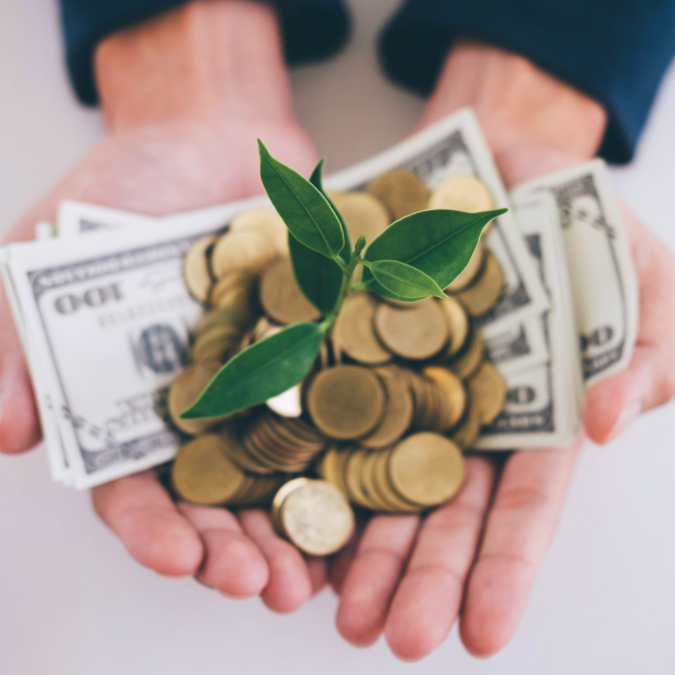by Vicky Monroe

Today I thought I’d share how my somatic therapy experience is affecting my approach to finances. First, I just want to say how much I enjoyed Ashley’s latest post, which has inspired this reflection I’m writing! Although I haven’t watched the documentary she mentioned yet, I think her summary touched on a lot of the economic uncertainties that have given me financial anxiety over the years.
There is a lot in the finance world that can’t be guaranteed. I just watched a great talk by Denise Hearn in which she mentioned that economics is one of the most imprecise and complex sciences. The lack of consensus and predictability within economics has made me feel pretty helpless in terms of finances at times.
Dealing With Economic Uncertainty
For example, future stock market returns can’t be predicted with 100% certainty. I can estimate the rate of return that my retirement fund will produce based on historical averages. But theoretically climate change could affect the stock market, or inflation could be higher than I think for the next few decades and hurt my retirement plans.
The more I learned about economic uncertainties like recessions and sequence of return risk, the more worried I got. Knowledge is power, right? So having a budget, good credit score, and all this financial knowledge should’ve made me feel safe. But I just got more anxious the more I dove into the personal finance world and tried to optimize my finances!
Focusing Too Much on “What Ifs”
I focused heavily on “unknowns” and “what ifs” that could be on the horizon, which made me deeply, unnecessarily anxious. Through somatic therapy, I’ve realized that feelings of psychological and financial security come from recognizing your resources and the things that are in your control.
That sounds pretty obvious when I state it plainly, to the point that I wonder why I didn’t realize it sooner! But anxiety isn’t rational and my brain can be overly emotional at times, which makes it hard to internalize self-evident life truths. I can’t tell you how many times I’d heard the Serenity Prayer, but I didn’t really internalize it until this latest round of therapy.
Identifying My Resources and Areas of Control
Once I made this mindset shift, I was able to start identifying, celebrating, and feeling grateful for my resources, which psychology experts define as:
“Psychosocial resources are the skills, beliefs, talents, and individual personality factors that influence how people manage stressful events. They include self-esteem, optimism, a sense of mastery, active coping skills, and social support.”
One of my resources is my financial knowledge. Although it probably can’t protect me from every economic pitfall out there, it puts me in a better position to identify and mitigate potential risks. Focusing on this resource instead of uncertainty allows me to combat financial anxiety.
Another resource I’ve recognized is my spouse. Women are often discouraged from thinking of our spouses as financial partners because of the possibility of divorce or financial infidelity. I’ve begun to deconstruct that narrative and live in my truth, which is that I can trust and count on my spouse financially and in life. This has given me a greater sense of financial and relational peace.
My frugality and the savings I’ve built over the past few years are also resources that help me feel safe. Instead of only focusing on the debt that I still have, I frequently remind myself that I can count my savings as resources. I don’t have enough saved for retirement yet or a fully paid off house. But I can celebrate each step in the journey and allow myself to feel an increasing sense of financial peace from each dollar I deposit in savings.
Feeling Empowered By Things in My Control
Things in my financial control are obviously my budget, savings rate, financial strategy, career moves, etc. I used to hyperfocus on these areas I can control and try to optimize them relentlessly, all in a misguided attempt to eradicate economic uncertainty. Now through therapy I know that it’s impossible to eliminate all “what ifs.” Instead of micromanaging the things I have total or partial control over, I’m allowing them to make me feel empowered.
Instead of focusing on all the “I can’ts” and things that are happening to me, I’m focusing on all the things I can accomplish. This shift from learned helplessness to empowerment has been huge for me.
Making Money Feel Embodied
A big part of somatic therapy is learning how to be more mindful and connected to your body. There’s so much emphasis on automation in the personal finance world that makes me feel disconnected from my money (the same way I used to feel “apart” from my body). For example, instead of manually transferring money to savings, I used to remove myself from the process entirely and use auto-deposits.
I’m trying to figure out how to make finances feel more “embodied” and less “autopilot,” just like my increasing connection to my body. I’ve been taking more baths, doing more exercise and yoga/stretching, and using lots of grounding techniques to feel centered in myself. Now I want to take that one step further and feel fully embodied in my financial life.
Somatic therapy has given me a deeper, more authentic sense of self. My mind and body feel more integrated and calm, and I’m not prone to anxiety and panic attacks like I used to be. My decisions feel like they’re being guided by rationality and internal wisdom instead of ever-changing emotions. It’s amazing how much tuning into the present moment can improve your life.
Cultivating Presence in My Financial Life
I want to feel that same sense of presence and peace while managing my finances. I don’t want to feel anxious or even neutral when I make a purchase or transfer money to savings. I want to feel joy and celebration! After all, money is a blessing, so it should be spent and saved with gratitude. Hopefully with the help of my therapist, I can begin to create a truly positive relationship with money and see it as a resource instead of a source of anxiety.
I’m considering making a video series or social media posts about how I’m trying to build a positive relationship with money. Do you think that’s a good idea? Do the ideas I expressed here resonate with you at all? I’d love to be able to help others going through financial anxiety to come out of it by sharing my experience, but I’m unsure of how I can be a resource to others!
Read More


